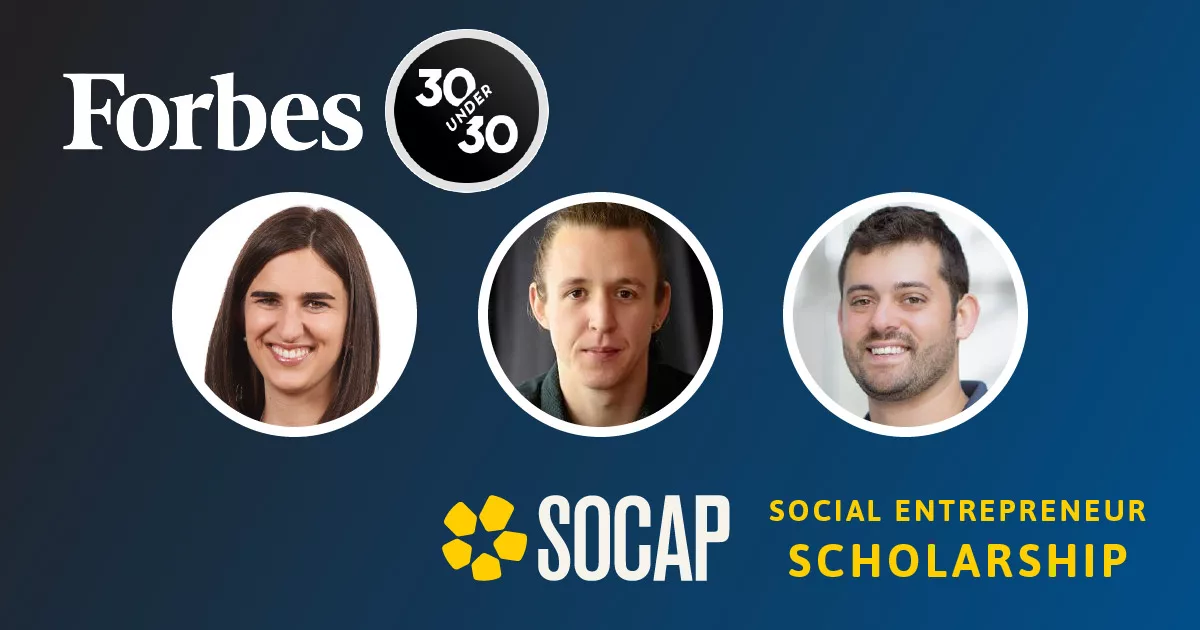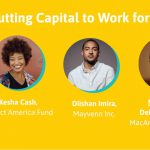Reminder: The deadline to apply for a 2019 SOCAP Entrepreneur Scholarship is June 30th, 2019! Apply here now.
Every year we find alums of the SOCAP Entrepreneur Scholarship program on the Forbes’ 30 Under 30 list of leading social entrepreneurs. We reached out to several members of the SOCAP community who were named on Forbes’ 2019 list of 30 Under 30 Social Entrepreneurs to ask if they would share some advice drawn from their own experience. We spoke with:Angelo Campus, Founder, BoxPower Inc, an innovative venture that builds solar microgrids and delivers them to communities in need in shipping containers.Thomas D’Eri, Cofounder, Rising Tide Car Wash, a social enterprise with a mission to employ adults with autism.Jenna Nicholas, Founder, Impact Experience, an organization that builds relationships between marginalized communities, impact investors, foundations, entrepreneurs, artists and local leaders to co-create innovative solutions to social challenges.
SOCAP: What is the most valuable piece of advice anyone ever gave you about social entrepreneurship?
Jenna Nicholas: Don’t take the status quo as a given. Be comfortable questioning established norms. Have confidence and conviction in exploring new ideas. Build relationships with allies and champions that can help support you in the execution of those ideas while also challenging you and the status quo in the process.
Thomas D’Eri: Run your social enterprise just like any other entrepreneur runs their business. The business model is the first and foremost piece of the operation. Although we probably all got into social entrepreneurship for reasons other than making a profit, simply put the organization won’t last long enough to have the impact it sets out for unless the business model is profitable and healthy. Many social entrepreneurs tend to focus their energies on their impact model because that is why they are doing what they are doing. But that is backwards. The business model has to be made really strong first and then you can advance the impact model as the operation matures.
Angelo Campus: Social entrepreneurship isn’t clean, easy, or straightforward. It doesn’t fit the startup model of do one thing, do it well, scale it really fast. If it is that easy, someone has probably already done it. If you are really trying to provide a service to someone who has been overlooked and neglected–and if you are truly in it for the impact first–figuring out how to get that service to that person in a sustainable way is going to be complicated and messy and it is going to take time.
SOCAP: Burnout is a major concern and challenge for many social entrepreneurs today. What do you do to take care of yourself and stay motivated in your work?
Jenna Nicholas: My daily prayer and meditation practice is a big part. There is a phrase from the Baha’i writings about, “living in a state of prayer.” I’m figuring out how to inculcate that sense of mindfulness throughout each day. I also work out every day. That is a powerful release of energy as well. Engaging with things that reground and reconnect me in the work is also really important. I find that re-reading or listening to poems and songs that have been written by participants who have taken part in our work is such a powerful way of remembering why we are doing what we are doing.
Thomas D’Eri: I have regular conversations with a coach. I think that is really important, especially when you are in a founder position because there are not many people that you can speak freely to. Team members and family members care deeply about you and can give honest feedback, but what you are saying to them impacts their lives. If you are upset or frustrated or feeling burnt out, having a coach means having a relationship with someone who is simply invested in my outcomes. They don’t have a dog in the race besides helping me working through the issue.
Angelo Campus: If you plan to be in it for the long haul–self care is incredibly important. If you aren’t taking time to care for your mental health, for your physical health, and for your relationships with family and friends–you will burn out. You will give up and you will move on to something easier. I’ve been in it for seven years now and I’ve gone through a couple of different periods where I let myself forget that and came close to the edge of burnout. Luckily I realized it or was reminded of it by people I’m close to and mentors. If you don’t protect yourself you will be your most limited and most valuable resource. You have to treat yourself like a machine that your business runs on. That includes giving your body rest and maintenance and love and care.
SOCAP: What tools or resources do you find most helpful in your role as a leader?
Jenna Nicholas: Fellowship programs such as Echoing Green, the Social Entrepreneur Scholarship at SOCAP, and other opportunities to be part of communities of people who are working on different things but that are all animated by similar motivations, is very helpful. To be able to have the support systems of those communities during both hard and good times, and to be champions of each other in the work has been very powerful.
Thomas D’Eri: The habit of reading helps me find new answers, better ways to do things, and new ideas. It keeps you motivated and gives you a bank of resources in your head–concepts that you can call on to help you solve problems. It makes the challenges more approachable because you can think hey I read something about this-let me go find it and think about it more.
Angelo Campus: You can never have enough good people. That includes your mentor network. Find champions–people who have done it before you, whether they are in the same industry or not. People who have started businesses, people who have tackled similar issues, people who have run organizations–you need those champions. You can go to them with hard questions. These aren’t investors or employees, these are people you can go to when you don’t know what to do or when you feel like you are stuck. I’ve been lucky that a few of my first mentors have been with us for seven or eight years now. I wouldn’t trade those relationships for any investor’s check.
SOCAP: What advice would you give to the 2019 SOCAP Scholarship Entrepreneurs on how to get the most out of the conference?
Jenna Nicholas: Reach out to people both in advance and at the conference. Look at the app and see who is attending and whether they might be aligned. Reach out to them. Go to sessions with people that are working in areas related to your work and approach them. For people who feel shy, remember the power of what you are doing and that it is a gift to share that experience and be able to learn from others in the process. Push your own limits and reach out to people even if it makes you uncomfortable.
Thomas D’Eri: Temper expectations that you are going to find your funder at the conference. Focus on finding people who can help you on your journey. There are so many awesome, bright, and talented people there that are dedicated to the work. There is a ton of great ecosystem support there–that is where the low hanging fruit is for the entrepreneurs. Don’t just laser focus on the idea that you’re going to find the person who is going to invest in your business. You might, but you are definitely going to find people that can be valuable and can help you.
Angelo Campus: Ask hard questions. Think about the people you want to meet. Go to the sessions that those people go to, whether or not it is directly relevant to what you’re doing. I’m a clean energy entrepreneur, but we play in a lot of other spaces: disaster relief, indigenous rights, rural electrification. Go to those sessions and challenge the status quo. Draw attention to yourself. Show that you are willing to go against the group think that often pervades social impact conferences of everyone patting themselves on the back. Don’t be afraid to make a statement. Show that you are thinking about the hard questions.
How to Come to SOCAP to Find Mentors and Peers
If you would like to help grow your peer network, find champions, and connect with entrepreneurs like these and others who were also named on the 2019 Forbes 30 Under 30 list of the world’s most impactful social entrepreneurs, including SOCAP SocEnt alums Xiaoyuan (Charlene) Ren, Founder, MyH2O; Rebecca Hui, Founder, Roots Studio; and Riley Jones, Cofounder, Bloc–then apply for the next SOCAP Entrepreneur Scholarship.
Time has already passed to submit your application for the SOCAP19 Entrepreneur Scholarship, but we will launch the application period for the SOCAP20 Scholarship in the spring. Sign up for the SOCAP email newsletter to receive advance notice of the date we will begin accepting applications.



